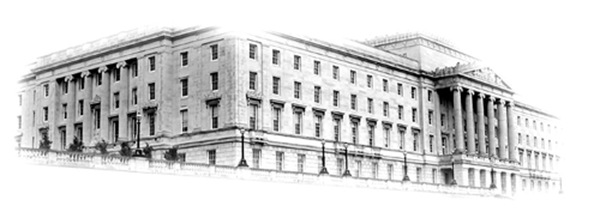Assembly round-up
Decision day approaches at Stormont as the Assembly starts to cut its own spending. Debates in November covered a potentially shared future, a divided past and way ahead for Northern Ireland’s energy policy.
This is the third winter of discontent since the recession started but the first one in which the Assembly has had to make hard choices. November opened with Peter Robinson updating the House on the Washington economic conference. In particular, he praised Hillary Clinton’s “ongoing involvement and interest”.
In keeping with the times, the Assembly voted to cut its running costs in line with government departments. Robinson found subsidised meals “very hard to justify” and Sean Neeson questioned why bottled water was provided at every committee meeting.
Sinn Féin’s call for an Irish language strategy was passed by 43 votes to 42, but blocked by a DUP-UUP petition of concern. Anna Lo described the debate as “tribal” at one point and suggested that more people spoke Polish or Chinese on a daily basis.
The House was more united in its condolences to the family of Aaron McCormick, killed in Afghanistan, including sympathy from Sinn Féin MLA Billy Leonard.
The Strategic Energy Framework was debated on 16 November with the Enterprise Committee calling for its full implementation. However, members found that it lacked ambition. More detail was needed on energy policy’s future from 2020 to 2050.
A tense debate on 22 November marked the seventieth anniversary of Lord Craigavon’s death. A statue of the unionist leader looks over the Great Hall but he left a bitterly contested legacy. Nationalists recalled discrimination while unionists paid tributes. The motion passed without a vote.
Trevor Lunn turned the House’s attention to integrated and shared education with his motion on 23 November. Increased sharing and integration in education was “absolutely fundamental” to creating a cohesive and integrated society, he commented.
An amendment that emphasised parental choice split the House 39-39 and was therefore overruled; this was supported by the SDLP, Sinn Féin and UUP but opposed by the DUP and Alliance. The agreed motion described the current system as “unsustainable” and called on the Education Minister to “actively promote a system of integrated and shared education throughout Northern Ireland.”
An agreed budget was becoming likely as agendaNi went to press. Other parties were frustrated by Sinn Féin’s reluctance to agree one earlier but the party is keen to avoid being seen as implementing British cuts. Reductions, though, are inevitable unless the Executive can agree how to raise new money.
November saw Stormont veteran Mark Durkan leave the Hill while Gerry Adams is soon to follow. Durkan was succeeded by Pól Callaghan rather than Helen Quigley following reports of an internal party dispute, denied by the SDLP.
Adam’s departure for Louth came as a surprise but the Sinn Féin president has struggled to find a role in the Assembly since its restoration. His lack of a ministry or committee seat lowered his profile. Pat Sheehan succeeds him.
That forthcoming co-option will bring the number of unelected MLAs to 14. The system is designed to keep the balance between the parties but also means that co-opted MLAs who resign before an election cannot be held to account at the ballot box.
The House rises for the Christmas recess on 17 December and returns on 10 January, with its first plenary on 17 January.






